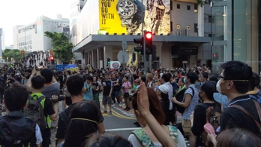
As China gains new influence in Hong Kong, religious groups find themselves divided about the future of and prospects for religious freedom in the former British colony. Amidst protests that have engulfed the city, China introduced a security law in the summer that monitors and punishes “subversive” activity. The Christian community had experienced divisions over their role in the protests, with activists wanting churches to take a more public role while official church bodies and congregations were concerned about becoming politicized and identifying with one side in the conflict. The South China Morning Post (October 9, 2020) reports that the concerns about the new law and the encroachment of China on church life have been strong enough for pastors to censure and self-censure their social media and even sermons. Writer Danny Mok reports that other Christians and clergy have decided to leave the city for the West. A part of the law ruling against sedition and collusion particularly concerns clergy who have strong ties to Christian organizations and denominations in the U.S. and Europe.
Attempts to resist China’s influence in Hong Kong could be seen in the Hong Kong 2020 Gospel Declaration, which called for the church to “reject the falsehood” of China’s totalitarian regime and to speak out about its deceptions. But Mok reports that the two pastors who organized the declaration have since left Hong Kong. Forty clerics and laypeople from the Methodist Church also issued joint statement last May opposing the law, and a group of 100 Anglicans protested against their leader, Canon Peter Koon Ho-ming, who counseled clergy not to be alarmed or anxious about the new measures. But now the tendency is more to avoid politics rather than be confrontational. The Hong Kong Free Press (October 8, 2020) reports that Catholics are not any less divided than Protestants. “Many churches have Beijing loyalist congregations and city leader Carrie Lam is herself a devout Catholic,” writes Su Xinqi. Shortly before the new security law was unveiled, Beijing’s Liaison Office in Hong Kong gathered more than 50 religious leaders to give their blessings to it, including from acting Catholic leader Cardinal John Tong. In two recent letters, Tong criticized clergy for “inciting hatred” by discussing politics in sermons and warned that people sympathetic to the democracy protests were damaging social harmony, Xinqi reports. Tong is in a delicate position as the Vatican and Beijing are preparing to renew a historic deal on the appointment of bishops in China, where Catholics are divided between a patriotic church and those loyal to Rome.
